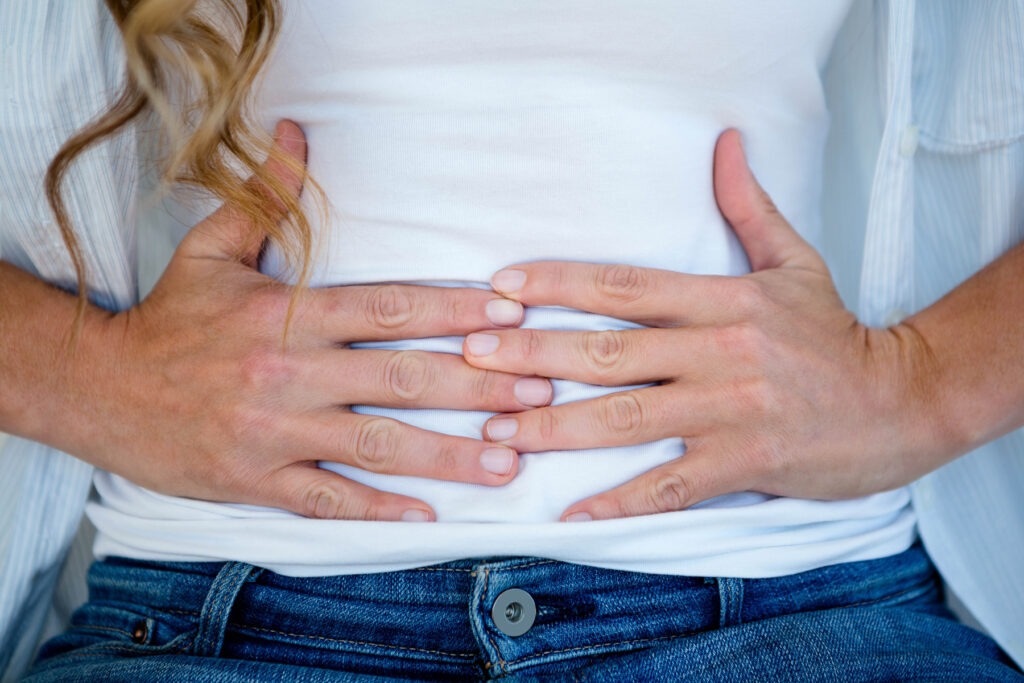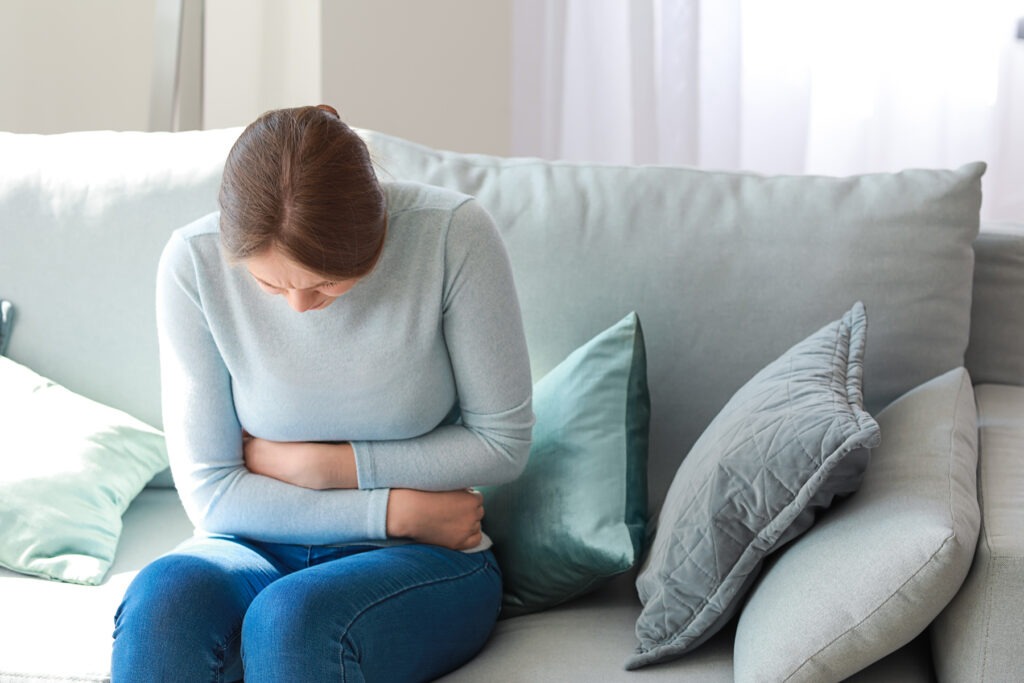by urban-acupuncture | Jul 5, 2023 | Acupuncture
Needle Away Bloating: How Acupuncture Can Help You Feel Lighter and Healthier

Bloating is a common digestive issue that can cause discomfort and even pain. It occurs when excess gas builds up in the stomach and intestines, making the abdomen feel swollen and full. While bloating is often the result of consuming certain foods or drinks, it can also be a symptom of underlying health conditions. If you suffer from bloating, you should explore natural remedies to alleviate the discomfort.
Acupuncture is now gaining acceptance in the mainstream medical community as a modern scientific process. It is increasingly being recognized as a valid medical therapy on its own. The World Health Organization (WHO) has endorsed it for over 100 conditions, including digestive disorders.
How Acupuncture Can Help Reduce Bloating
Acupuncture is a process that stimulates the nervous system and triggers a series of physiological responses that can help reduce bloating. Acupuncture points are typically located along nerve pathways, and inserting needles at these points, can activate the nerves and stimulate the release of various neurotransmitters and hormones. For example, acupuncture can stimulate the release of endorphins, which are natural painkillers that can help reduce inflammation and alleviate discomfort associated with bloating.
It can also activate the parasympathetic nervous system, which is responsible for controlling digestion and relaxation. By stimulating this system, acupuncture can promote digestive motility and reduce the buildup of gas in the intestines. Additionally, acupuncture can regulate the levels of serotonin, a neurotransmitter that helps control intestinal contractions and can help reduce bloating. So, acupuncture can help reduce bloating by modulating the nervous system, promoting digestive motility, and reducing inflammation.
What to Expect During an Acupuncture Session for Bloating
First, the acupuncturist will typically ask you about your medical history, including any digestive issues you may have. They may also ask you about your diet and lifestyle habits to better understand the underlying causes of your bloating. Next, the acupuncturist will locate the acupoints specific to your condition and insert thin needles into these points.
You may feel a slight pinch or pressure as the needles are inserted, but it is painless. The needles will remain in place for 20–30 minutes while you rest comfortably. Some acupuncturists may also use other techniques, such as cupping, to enhance the effects of the treatment. After the session, you may feel relaxed and refreshed, and you may notice a reduction in bloating over time.
Treatment
Acupuncture is a safe and effective alternative treatment for bloating. By stimulating the nervous system, and reducing inflammation, it can help alleviate bloating symptoms and improve overall gastrointestinal health. If you’re suffering from bloating, consider consulting with a licensed acupuncturist to explore the benefits of this natural therapy.
Contact Urban Acupuncture Center in Columbus, OH For More Information
For more information about how acupuncture, massage therapy and other alternative healing treatments can help you, please contact the Urban Acupuncture Center Board Certified Licensed Acupuncturist’s team at Indianola Ave, Columbus, Ohio (Clintonville) (614) 725-2488 or click here. Taking new patients in and around greater Columbus, Ohio.
by urban-acupuncture | Jul 1, 2023 | Acupuncture
Digestive Problem Treatment

Digestive problems are a common complaint among many people. It can be caused by a variety of reasons, such as poor diet, stress, anxiety, and underlying medical conditions. If not taken care of, it can lead to a wide range of symptoms, including mild discomfort, severe pain, bloating, and constipation. While there are various treatments available, acupuncture is a safe and effective alternative that has gained popularity in recent years. Let’s explore how acupuncture can help treat digestive problems and how it works within the modern understanding of anatomy and physiology.
What is Acupuncture?
Acupuncture is a form of traditional Chinese medicine that has been around for thousands of years. The practice involves inserting thin needles into specific points in the body to stimulate the nervous system and promote natural healing. While acupuncture is rooted in traditional Chinese medicine, it is now being accepted and practiced in the Western medical world.
How Acupuncture Works for Digestive Problems
Acupuncture, the ancient healing art, is a sophisticated targeting system that operates by directly engaging with the body’s intricate nervous and endocrine networks. By stimulating specific points on the skin, acupuncture triggers a cascade of physiological responses that travel along the body’s connective and fascial highways, culminating in a profound impact on the entire physical structure.
This exquisite system excites the nervous tissue, leading to a sequence of chemical and hormonal responses that permeate throughout the body. From the sinewy muscles to the deepest internal organs, these responses terminate in the most crucial of all human organs, the brain.
Acupuncture’s elegant mechanisms leverage the intricate pathways of the body’s various systems, leading to a harmonious and holistic healing experience. It is a form of therapy that acknowledges the interconnectedness of the human body’s various systems and promotes a well-balanced, healthy state.
The Digestive System and Acupuncture
In modern anatomy and physiology, the digestive system is controlled by the autonomic nervous system. The sympathetic nervous system is responsible for the “fight or flight” response, which can cause digestive problems when activated too often. Acupuncture helps regulate the nervous system’s response by activating the parasympathetic nervous system, which is responsible for the “rest and digest” response. This helps reduce stress and anxiety levels, which are often the root causes of digestive problems.
Acupuncture also helps improve blood flow and oxygen supply to the digestive organs, which can improve their overall function. By stimulating specific points in the body, it can help relieve bloating, constipation, diarrhea, and other digestive problems. In addition, it can help reduce inflammation in the digestive tract, which is often associated with conditions like irritable bowel syndrome (IBS).
Acupuncture Treatment for Digestive Problems
Before starting an acupuncture treatment, an acupuncturist will conduct a thorough consultation and examination to determine the underlying causes of your digestive problems. Based on your individual needs, they will develop a personalized treatment plan that may include a combination of acupuncture, herbal medicine, and dietary changes.
Acupuncture treatment for digestive problems typically involves the insertion of thin needles into specific points on the body, including the abdomen, back, and limbs. The needles are left in place for a few minutes, during which time you may feel a mild tingling sensation. The treatment is generally painless, and most patients find it relaxing and enjoyable.
Overall, acupuncture is a safe and effective treatment for digestive problems. By stimulating specific points in the body, acupuncture can help improve the function of the digestive organs and reduce symptoms like bloating, constipation, and diarrhea. If you are suffering from digestive problems, acupuncture may be a safe and effective treatment option for you. Talk to your healthcare provider to see if acupuncture is right for you.
Contact Urban Acupuncture Center in Columbus, OH For More Information
For more information about how acupuncture, massage therapy and other alternative healing treatments can help you, please contact the Urban Acupuncture Center Board Certified Licensed Acupuncturist’s team at Indianola Ave, Columbus, Ohio (Clintonville) (614) 725-2488 or click here. Taking new patients in and around greater Columbus, Ohio.


